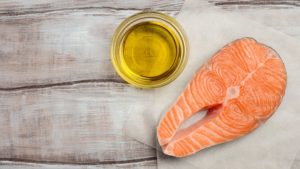Polyunsaturated fats are lipids in which the constituent hydrocarbon chain possesses two or more carbon–carbon double bonds. Polyunsaturated fat can be found mostly in nuts, seeds, fish, algae, leafy greens, and krill.
Contents
Uses
- Polyunsaturated fat is a type of dietary fat. It is one of the healthy fats, along with monounsaturated fat.
- Polyunsaturated fat is found in plant and animal foods, such as salmon, vegetable oils, and some nuts and seeds.
- Eating moderate amounts of polyunsaturated (and monounsaturated) fat in place of saturated and trans fats can benefit your health.
- Polyunsaturated fat is different than saturated fat and trans fat. These unhealthy fats can increase your risk for heart disease and other health problems.
Benefits
- Polyunsaturated fats can help reduce bad cholesterol levels in your blood which can lower your risk of heart disease and stroke.
- They also provide nutrients to help develop and maintain your body’s cells.
- Oils rich in polyunsaturated fats contribute vitamin E to the diet, an antioxidant vitamin most Americans need more of.
- Oils rich in polyunsaturated fats also provide essential fats that your body needs but can’t produce itself – such as omega-6 and omega-3 fatty acids. You must get essential fats through food. Omega-6 and omega-3 fatty acids are important for many functions in the body.
- Polyunsaturated fats include omega-3 and omega-6 fats. These are essential fatty acids that the body needs for brain function and cell growth. Our bodies DO NOT make essential fatty acids, so you can only get them from food.
Cautions
- n/a
Interactions
- Unknown, please consult with your doctor.
Other names
PUFA
References
Source: Wikipedia, https://en.wikipedia.org/wiki/Polyunsaturated_fat
Medline Plus, https://medlineplus.gov/ency/patientinstructions/000747.htm
Healthy for Good, https://healthyforgood.heart.org/Eat-smart/Articles/Polyunsaturated-Fats

